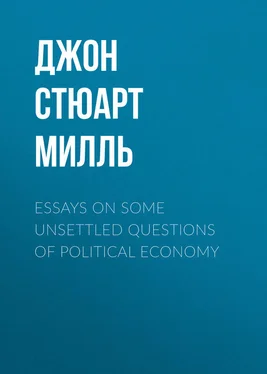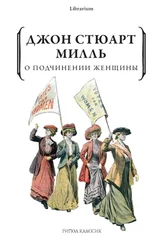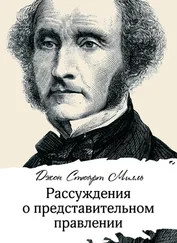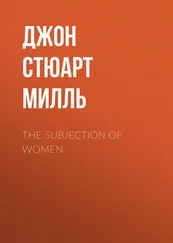Джон Милль - Essays on some unsettled Questions of Political Economy
Здесь есть возможность читать онлайн «Джон Милль - Essays on some unsettled Questions of Political Economy» — ознакомительный отрывок электронной книги совершенно бесплатно, а после прочтения отрывка купить полную версию. В некоторых случаях можно слушать аудио, скачать через торрент в формате fb2 и присутствует краткое содержание. Жанр: Философия, literature_19, foreign_antique, foreign_prose, на английском языке. Описание произведения, (предисловие) а так же отзывы посетителей доступны на портале библиотеки ЛибКат.
- Название:Essays on some unsettled Questions of Political Economy
- Автор:
- Жанр:
- Год:неизвестен
- ISBN:нет данных
- Рейтинг книги:4 / 5. Голосов: 1
-
Избранное:Добавить в избранное
- Отзывы:
-
Ваша оценка:
- 80
- 1
- 2
- 3
- 4
- 5
Essays on some unsettled Questions of Political Economy: краткое содержание, описание и аннотация
Предлагаем к чтению аннотацию, описание, краткое содержание или предисловие (зависит от того, что написал сам автор книги «Essays on some unsettled Questions of Political Economy»). Если вы не нашли необходимую информацию о книге — напишите в комментариях, мы постараемся отыскать её.
Essays on some unsettled Questions of Political Economy — читать онлайн ознакомительный отрывок
Ниже представлен текст книги, разбитый по страницам. Система сохранения места последней прочитанной страницы, позволяет с удобством читать онлайн бесплатно книгу «Essays on some unsettled Questions of Political Economy», без необходимости каждый раз заново искать на чём Вы остановились. Поставьте закладку, и сможете в любой момент перейти на страницу, на которой закончили чтение.
Интервал:
Закладка:
But if we apply to these questions the principles already explained, we shall see that this is not by any means a universal law: the fact may correspond with it, or it may not.
For suppose that the prices have adjusted themselves, no matter how, and that the imports and exports balance one another, each commodity, of course, being dearer by the cost of carriage, in the country which imports than in that which exports it: and suppose now that the cost of carriage, both of the one and of the other, were suddenly and miraculously annihilated, and that the commodities could pass from country to country without expense. If each country bore its own cost of carriage before, each country will save its own cost of carriage now. Cloth, in Germany, will in that case fall exactly to what it is in England; linen in England, to what it is in Germany.
Now this fall of price, supposing it to happen, will probably affect the demand on both sides; and it will either affect it alike in both countries, or it will affect it unequally. It will affect it alike, if the fall of price does not affect the demand at all, or if it affects it equally in both countries. If either of these results should take place, the cloth and the linen would continue to balance each other as before: no money would pass from one country to the other; prices in both would continue at the point to which they had fallen, and each country would exactly save the cost of carriage on the commodity which it imports from the other.
But the result might be, that the fall of price might not have an effect exactly equal, on the demand in the two countries. Suppose, for instance, that the fall of cloth in Germany owing to the saving of the cost of carriage, did not increase the demand for cloth in Germany; but that the fall of linen in England from a like cause, did increase the demand for linen in England. The linen imported would be more than could be paid for by the cloth exported: the difference must be paid in money: the change in the distribution of the precious metals between the two countries would lower the price of cloth in England, (and consequently in Germany), while it would raise the price of linen in Germany, (and consequently in England). Germany, therefore, by the annihilation of cost of carriage, would save in price more than the cost of carriage of the cloth; England would save less in price than the cost of carriage of the linen. But if by the miraculous annihilation of cost of carriage, England would not save the whole of the carriage of her imports, it follows that England did not previously pay the whole of that cost of carriage.
Thus, the division of the cost of trade, and the division of the advantage of trade, are governed by precisely the same principles; and the only general proposition which can be affirmed respecting the cost is, that it is pro tanto a deduction from the advantage. It cannot even be maintained that the cost is shared in the same proportion as the advantage is; because the increase of the demand for a commodity as its price falls, is not governed by any fixed law. Suppose, for instance, that the advantage happened to be divided equally: this must be because the greater cheapness arising from the establishment of the trade, either did not affect the demand at all, or affected it in an equal proportion on both sides. Now, because such is the effect of the degree of increased cheapness resulting from importation burthened with cost of carriage, it would not follow that the still greater degree of cheapness, produced by the additional saving of the cost of carriage itself, would also affect the demand of both countries in precisely an equal degree. But we cannot be said to bear an expense, which, if saved, would be saved to somebody else, and not to us. Two countries may have equal shares of the clear benefit of the trade, while, if the cost of carriage were saved, they would divide that saving unequally. If so, they divide the gross gain in one unequal ratio, the cost in another unequal ratio, though their shares of the cost being deducted from their shares of the gain leave equal remainders.
4. The question naturally suggests itself, whether any country, by its own legislative policy, can engross to itself a larger share of the benefits of foreign commerce, than would fall to it in the natural or spontaneous course of trade.
The answer is, it can. By taxing exports, for instance, we may, under certain circumstances, produce a division of the advantage of the trade more favourable to ourselves. In some cases, we may draw into our coffers, at the expense of foreigners, not only the whole tax, but more than the tax: in other cases, we should gain exactly the tax, – in others, less than the tax. In this last case, a part of the tax is borne by ourselves: possibly the whole, possibly even, as we shall show, more than the whole.
Suppose that England taxes her export of cloth: the tax not being supposed high enough to induce Germany to produce cloth for herself. The price at which cloth can be sold in Germany is augmented by the tax. This will probably diminish the quantity consumed. It may diminish it so much, that even at the increased price, there will not be required so great a money value as before. It may diminish it in such a ratio, that the money value of the quantity consumed will be exactly the same as before. Or it may not diminish it at all, or so little, that, in consequence of the higher price, a greater money value will be purchased than before. In this last case, England will gain, at the expense of Germany, not only the whole amount of the duty, but more. For the money value of her exports to Germany being increased, while her imports remain the same, money will flow into England from Germany. The price of cloth will rise in England, and consequently in Germany; but the price of linen will fall in Germany, and consequently in England, We shall export less cloth, and import more linen, till the equilibrium is restored. It thus appears, what is at first sight somewhat remarkable, that, by taxing her exports, England would, under some conceivable circumstances, not only gain from her foreign customers the whole amount of the tax, but would also get her imports cheaper. She would get them cheaper in two ways, – for she would obtain them for less money, and would have more money to purchase them with. Germany, on the other hand, would suffer doubly: she would have to pay for her cloth a price increased not only by the duty, but by the influx of money into England, while the same change in the distribution of the circulating medium would leave her less money to purchase it with.
This, however, is only one of three possible cases. If, after the imposition of the duty, Germany requires so diminished a quantity of cloth, that its total money value is exactly the same as before, the balance of trade will be undisturbed; England will gain the duty, Germany will lose it, and nothing more. If, again, the imposition of the duty occasions such a falling off in the demand, that Germany requires a less pecuniary value than before, our exports will no longer pay for our imports, money must pass from England into Germany, and Germany's share of the advantage of the trade will be increased. By the change in the distribution of money, cloth will fall in England; and therefore it will, of course, fall in Germany. Thus Germany will not pay the whole of the tax. From the same cause, linen will rise in Germany, and consequently in England. When this alteration of prices has so adjusted the demand, that the cloth and the linen again pay for one another, the result is, that Germany has paid only a part of the tax, and the remainder of what has been received into our treasury has come indirectly out of the pockets of our own consumers of linen, who pay a higher price for that imported commodity, in consequence of the tax on our exports, which at the same time they, in consequence of the efflux of money and consequent fall of prices, have smaller money incomes wherewith to pay for the linen at that advanced price.
Читать дальшеИнтервал:
Закладка:
Похожие книги на «Essays on some unsettled Questions of Political Economy»
Представляем Вашему вниманию похожие книги на «Essays on some unsettled Questions of Political Economy» списком для выбора. Мы отобрали схожую по названию и смыслу литературу в надежде предоставить читателям больше вариантов отыскать новые, интересные, ещё непрочитанные произведения.
Обсуждение, отзывы о книге «Essays on some unsettled Questions of Political Economy» и просто собственные мнения читателей. Оставьте ваши комментарии, напишите, что Вы думаете о произведении, его смысле или главных героях. Укажите что конкретно понравилось, а что нет, и почему Вы так считаете.











